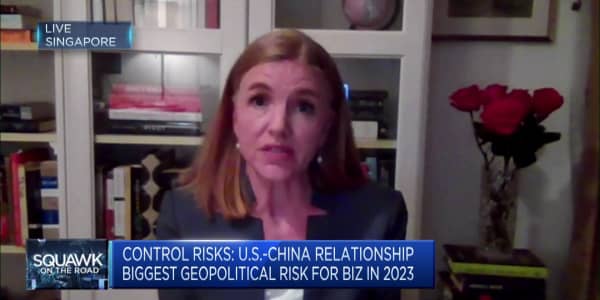2014 has already proved dramatic for a number of reasons, not least the geopolitical tensions rocking financial markets. Here, top political risk experts and economists identify the regions that pose some of biggest geopolitical risks to the world economy in months to come.
By Hamza Ali, special to CNBC.com
Ukraine
Conflict in Ukraine, which is fueling wider tensions between Russia and the West, seems set to continue. A resolution between pro-Russian separatists and Ukrainian forces remains elusive.
"The combination of the Ukrainian government's intensified military offensive to regain separatist-controlled territory in the eastern Donbass region, the mounting death toll in the conflict, the worsening humanitarian situation for civilians, and Russian government plans to dispatch an independent, non-Red Cross-affiliated aid convoy are contributing to a significant increase in tensions," said Tina Fordham, chief global political analyst.
EU leaders met again Saturday to thrash out a solution to the Ukraine crisis that according to Ukrainian Prime Minister, Petro Poroshenko, is on the brink of spiraling into a full scale war.
The leaders issued Russia an ultimatum, giving the country a week to reverse course in Ukraine or face a new round of sanctions.
"Ukraine is a very small economy and so far the conflict remains contained, making Russia's stock market the main loser in the conflict," said Liza Ermalenko, an emerging markets economist at Capital Economics.
Russia
Increasingly an international pariah state, Russia has sparked controversy and protest over its support for President Bashar al-Assad in Syria and separatists in Ukraine as well as its annexation of the Ukrainian region of Crimea.
Russia's recent activities in Ukraine have seen wide-ranging sanctions imposed on it by the U.S. and the European Union.
"A long conflict could be a drain on the Russian economy, which is already weak, and close to recession," said Tim Ash, Standard Bank's head of emerging market research.
He also pointed out that Russia faces the risk of yet more Western sanctions and asset freezes which will further slow investment and growth.
Already this year, the International Monetary Fund has cut its forecasts for Russia's beleaguered economy amid concerns over the crisis in Ukraine. The escalating tensions in Ukraine could mean further sanctions imposed by the U.S. and its allies.
Further isolation of Russia could have far-reaching consequences, as Russia is an important source of natural gas and oil and an important trading partner for the world's leading economies. Germany's economy is already showing signs of weakness as investors grow increasingly nervous over the crisis.
Nigeria
Nigeria's economy appeared to expand at a dramatic rate this year, when its gross domestic product was recalculated. Standing at the new total of $510 billion, Nigeria's economic output exceeds that of South Africa, making it Africa's largest economy with approximately a fifth of the continent's entire GDP.
However, it remains a geopolitical hotspot. Boko Haram, an Islamist militant group that operates largely in the north of the country, is the most obvious geopolitical risk to both Nigeria and the rest of West Africa.
"There are attacks nearly every day in the north-eastern part of Nigeria" since 2009 when Boko Haram's insurgency began, says Capital Economics' Emerging Markets Economist for Africa, Shilan Shah. "However there are a lot of other political risks in Nigeria."
These include, among others, civil unrest that is expected to come to a head around the 2015 elections, oil piracy and corruption.
Gaza
A fragile peace in Gaza brokered by Egypt following one of the most intense conflicts in years has so far held. However tensions remain in the region; previous truces in the region have sometimes lasted less than the arranged 48 hours.
The truce ended seven weeks of fighting that has left more than 2,200 people - mostly Palestinians – dead.
It is the latest incarnation of the controversial and long-running Israeli-Palestinian conflict that remains among the most intractable in the last 60 years. However current tensions have carried a sense of urgency on the part of Israel.
"Hamas benefits from significant external support," said Slim Feriani, executive chairman of Advance Emerging Capital.
"The Muslim Brotherhood has gained a lot of power in several MENA (Middle East and North Africa) countries such as Turkey, Tunisia, Libya, Egypt etc. and the Islamic State has evolved from an embryonic stage into a serious regional and global threat."
This has put the onus on Israel to contain Hamas sooner rather than later, with the threat of a more serious war between the Israelis and Arabs increasingly likely.
Iraq
The sudden rise of the Islamic State, formerly known as ISIS (Islamic State of Iraq and Syria), out of the war in Syria has seen a dramatic escalation in Iraq's political and sectarian tensions. It has affected everything from regional stability to crucial oil exports.
"ISIS has taken over huge swaths of the country," said Jason Tuvey, assistant economist at Capital Economics. "In the past few months it looks like country has edged towards the brink of war".
Not only is ISIS damaging current exports, but it is also hampering the development of the oil sector.
"The advance of ISIS poses a threat to the expansion of the oil sector…which is largely dependent on greater output coming from the north of the country, and with ISIS in control this looks unlikely as investment is unlikely to go there."
Syria
Syria has undergone a massive amount of change since last August when the U.S. was threatening to carry out airstrikes against the government of President Bashar al-Assad In the wake of a chemical attack that Washington blamed on his forces.
The battle to remove Assad from power has helped spawn a number of different Islamist groups that have spilled over into neighboring states, creating for the first time a common enemy for Syria and the rest of region.
Slim Feriani pointed to the economic damage being done to the region. "The economies of MENA will remain inhibited by what's happening across the region and the biggest pain will continue to be inflicted on those counties that are unstable at the political and social level such as Syria, Iraq and Libya."
China/Japan
China's moves in the Pacific and South China seas, as it flexes its economic and military muscle, have seen it butt heads with many neighbors over territorial issues.
The most notable of these disputes is its tussle with Japan over eight uninhabited islands and rocks in the East China Sea.
The islands, called Senkaku by Japan and Diaoyu by China, have a total area of about 7 sq km and lie north-east of Taiwan, east of the Chinese mainland and south-west of Japan's southern-most prefecture, Okinawa.
The islands remain a thorny issue with both sides refusing to sit at the negotiating table. The disagreement threatens to destabilize two of the world's leading economic power players.
"As Japan does not recognize that there is a dispute over the islands, there are no negotiations taking place. And in fact China has said that until Japan recognizes that there is a dispute over the islands, there can be no discussions between them," Ian Storey, Senior Fellow at the Institute of Southeast Asian Studies told CNBC via email.
"All of this is complicated by the fact that since Prime Minister Shinzo Abe's visit to the Yasukuni Shrine last December. All high level contacts between the Chinese and Japanese governments have been suspended."




